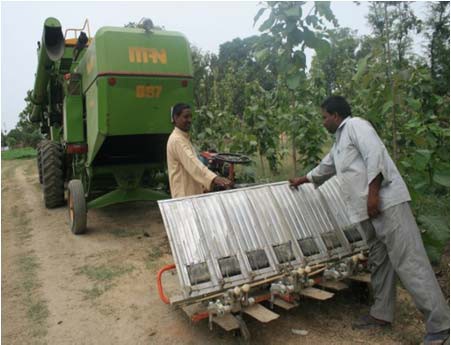
Ramavadh is a progressive landowner farmer in Eastern Uttar Pradesh. With limited access to extension services, he depended on resource-intensive traditional agricultural practices that did not substantially increase his yield. In 2009, in order to improve his farm yield and income, Ramavadh joined the Cereal Systems Initiative for South Asia (CSISA) project that is supported by USAID, Bill and Melinda Gates Foundation and the World Bank.
By developing and deploying new crop varieties and sustainable crop management technologies, CSISA assists resource poor families in South Asia to increase their farm productivity and incomes. It partners with farmers to demonstrate new technologies and practices. These farmers then become champions of these technologies and encourage other farmers to adopt them. Ramavadh was the first farmer in his village who was willing and had the capacity to apply the technology to his field.
In 2010, he planted wheat using the “zero-till” practice. It involves the retention of residue from the previous crop cycle on the field that helps retain organic matter and soil moisture, thus improving the quality of the soil. By eliminating the need to plow, farmers then use a “zero-till” machine to plant seeds into the crop residue. Using the technology Ramavadh reduced his production costs (seed, water, and tillage) from $179 to $112 per acre and increased his yield from 1.8 tons to 2.6 tons per acre.
Encouraged, he then used the CSISA-promoted mechanical rice transplanter. This machine uses just four laborers to transplant three to five acres in a day, instead of the usual 13 -14 people needed to transplant one acre. It reduced his daily labor costs from approximately $27 to $11 per acre. By planting in uniform rows and in optimum plant density, he increased his yield from 2.3 tons to 3.5 tons per acre.
Impressed with his results, 350 neighboring farmers have adopted these practices. Today, Ramavadh works closely with CSISA to advise and disseminate these technologies to other farmers. As a custodian of the CSISA-owned machines, he earns an additional profit of about $3,000 a year by hiring them out to interested farmers.







Comment
Make a general inquiry or suggest an improvement.